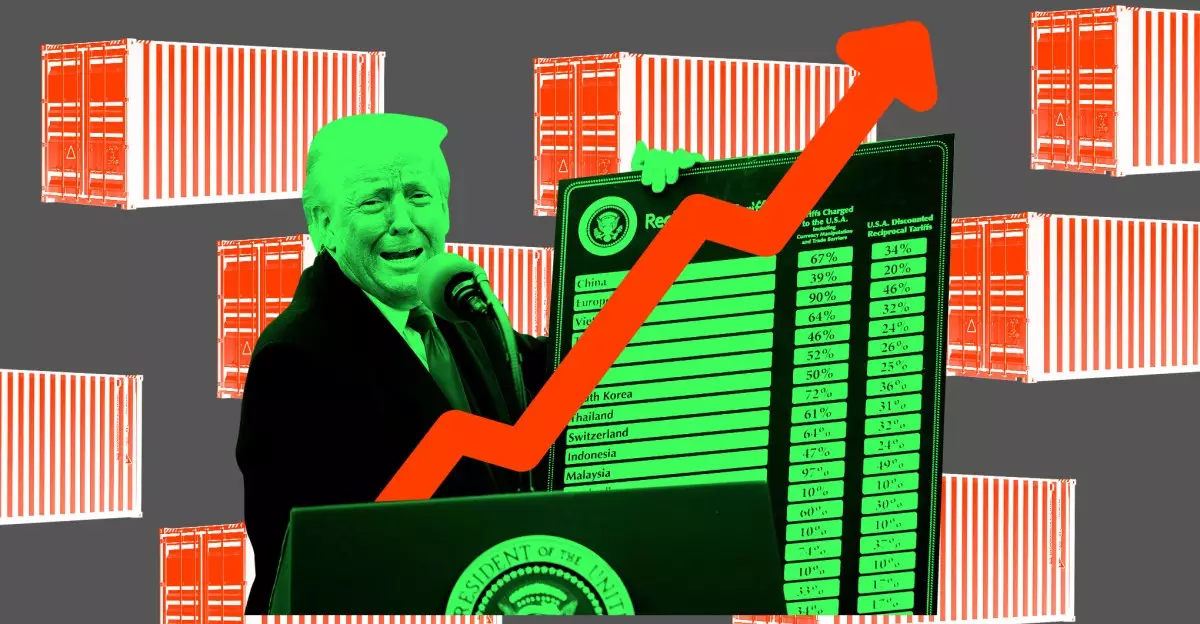The ever-evolving landscape of technology and global politics has put major players like Meta, Apple, and Tesla in a precarious situation. These companies have been thrust into the role of bargaining chips in a larger geopolitical game, particularly with the United States under President Donald Trump’s administration. Initially, it seemed that Trump would champion the tech moguls who backed him. However, as trade tensions escalated, these very titans of technology became collateral damage. The adverse repercussions have raised alarms within the tech sphere, as industries grapple with the unpredictability of international trade relations.
European Commission President Ursula von der Leyen’s suggestion to impose a levy on the advertising revenues of digital services—particularly if negotiations between the US and EU sour—highlights the increasing pressure on these tech giants. For CEOs like Mark Zuckerberg, who anticipated a more business-friendly environment under Trump’s leadership, this development is a jarring reality. Instead of gaining an upper hand against European regulators, tech leaders now find themselves in a bind—facing both punitive measures and tariffs.
The Social Media Dilemma: A Fragile Existence
The tumultuous approval ratings of prominent figures like Elon Musk further complicate the scenario. Musk’s growing association with Trump, juxtaposed with Tesla’s plunging stock prices, illustrates a fragile relationship between corporate leadership and political leanings, which can significantly sway consumer and investor sentiment. The exodus of options for consumers wishing to purchase US-made vehicles in China due to tariffs epitomizes the unraveling of international business connections and the potential long-term damage to brand loyalty.
TikTok stands out as an extraordinary case in this unfolding drama. Brought to a standstill by the weight of tariffs imposed by a tense US-China interplay, TikTok is navigating a minefield. China’s official response to the potential sale negotiations underscores the stakes involved as they firmly oppose actions that they believe trample on market dynamics and fairness. Consequently, the app’s viability in the US is hanging by a thread, further showcasing the harsh realities of technology interlacing with global politics.
OpenAI: The Ethical Tightrope
Meanwhile, OpenAI is facing its separate set of challenges as it attempts to distance itself from its nonprofit roots. A coalition of ex-employees, along with outside observers, are questioning the organization’s pivot and whether it has misused its charitable status. The tension surrounding OpenAI illustrates a growing skepticism about ethical practices in tech and the balance between profit motives and societal good.
The ambiguity surrounding these rapid changes—especially in a sector where governance is essential—can lead to public and investor distrust. As OpenAI pursues a more commercial path, it may find itself under even more scrutiny, echoing the fate of other tech behemoths that have fallen from grace or faced backlash due to policy slip-ups or public relations disasters.
Layoffs and the Transformation of Work Culture
As the specter of layoffs looms, figures from within major corporations like Google reveal an unsettling undercurrent of anxiety among employees. With transitioning labor practices becoming the norm thanks to automation and artificial intelligence, these layoffs have emerged as a poignant reflection of the changing landscape of the workplace. The unease experienced by employees is compounded by inconsistencies seen in severance packages—leading to questions regarding the company’s commitment to its workforce even as it attempts to streamline operations.
This tumultuous environment has led to increased calls for companies to redefine their operational ethos. In an era where tech giants must embrace transparency and ethical labor practices, anything short of that could yield disastrous fallout in public perception and employee morale.
The Broader Implications for the Tech Industry
The overarching narrative showcases that the tech industry’s ascent has granted it immense power—but this power comes with pronounced risks. As globalization pushes these companies to the forefront of international politics, they now exist as pawns in transactions far beyond the walls of their corporate offices. The current state of affairs serves as a stark reminder that while tech serves as a vehicle for innovative advancements, it can also become mired in the complexities of political conflict.
The continuous intertwining of technology and international policy calls for executives to navigate an increasingly delicate web of commerce and diplomacy. Balancing the pressures from governments, shareholders, and public sentiment will prove to be the true test of leadership in the tech realm moving forward. The pressures may seem insurmountable, but how these companies adapt will ultimately shape not only their futures but also the very fabric of the digital economy.

